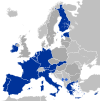- Presidency of the Council of the European Union
-
Presidency of the Council of the European Union Term length Six months Inaugural holder  Belgium
BelgiumWebsite pl2011.eu European Union 
This article is part of the series:
Politics and government of
the European UnionPolicies and issuesThe Presidency of the Council of the European Union is the responsibility for the functioning of the Council of the European Union that rotates between the member states of the European Union (EU) every six months. The presidency is not a single president but rather the task is undertaken by a national government. It is also not the "Presidency of the EU" (although it is sometimes called that), as there is no such thing: each EU institution has its own President. Three successive Council presidencies, known as presidency trios, cooperate for an 18-month period to provide additional continuity by sharing common political programmes. The current (2011–2012) trio consists of Poland (which took up the position 1 July 2011), Denmark (which will take over in January 2012) and Cyprus (will take over in July 2012).
Contents
History
When the Council was established, its work was minimal and the presidency rotated between each of the then-six members every six months. However as the work load of the Council grew and the membership increased, the lack of coordination between each successive six month presidency hindered the development of long-term priorities for the EU. In order to rectify the lack of coordination, the idea of trio presidencies were put forward where groups of three successive presidencies cooperated on a common political program. This was implemented in 2007 and formally laid down in the EU treaties in 2009 via the Treaty of Lisbon.
Until 2009, the EU Council Presidency had assumed political responsibility in all areas of European integration, and it played a vital role in brokering high level political decisions through the contact among national diplomats in Brussels.
The Treaty of Lisbon strongly reduced the importance of the Presidency, significantly by officially separating the European Council (EU heads of state or government) from the Council of the European Union, thus terminating the capacity of the head of state or government of the member state holding the Presidency to be President of the European Council. Simultaneously it split the foreign affairs Council configuration from the General Affairs configuration and made the High Representative the chairman rather than the foreign minister of the Presidency state. In the current EU constitutional framework, the EU Council retains the task to actively engage in negotiating legislation among member states and among the EU Council and the European Parliament, although the most difficult dossiers are subsumed by the President of the European Council.[1]
On top of the intended downgrading of the rotating Council presidency, the presidency has become even less influential in practice than planned. The High Representative has been taking on roles previously guarded by the presidency country's foreign minister and the European Council president has begun acting on finance policy; the most important policy area left to the rotating presidency. It is expected that the European Council president would be strengthened further when Belgium holds the rotating Presidency.[2] There was some previous opposition to downgrading the rotating presidency too much with Sweden claiming it would disengage member states from feeling actively engaged in running the EU, especially smaller states.
Functioning
The Council meets in various formations where its composition depends on the topic discussed. For example, the Agriculture Council is composed of the national ministers responsible for Agriculture.
The primary responsibility of the Presidency is to organise and chair all meetings of the Council, apart from the Foreign Affairs Council which is chaired by the High Representative. So, for instance, the Minister of Agriculture for the state holding the presidency chairs the Agriculture council. This role includes working out compromises capable of resolving difficulties.
Article 16(9) of the Treaty on European Union provides:
The Presidency of Council configurations, other than that of Foreign Affairs, shall be held by Member State representatives in the Council on the basis of equal rotation, in accordance with the conditions established in accordance with Article 236 of the Treaty on the Functioning of the European Union.Each three successive presidencies cooperate on a "triple-shared presidency" work together over a 1.5 year period to accomplish a common agenda by the current president simply continuing the work of the previous "lead-president" after the end of his/her term. This ensures more consistency in comparison to a usual single six month presidency and each three includes a new member state. This allows new member states to hold the presidency sooner and helps old member states pass their experience to the new members.
The role of the rotating Council Presidency includes:
- agenda-setting powers: in its 6-month programme, it decides on the order to discuss propositions, after they have been submitted by the Commission in its agenda monopoly powers;
- brokering inter-institutional compromise: trialogues between Commission, Parliament and Council are held to reach early consensus in the codecision legislative procedure; the Presidency takes part to the Conciliation Committee between Parliament and Council in the 3rd stage of the codecision legislative procedure;
- coordinating national policies and brokering compromise between member states in the Council (“confessional system”)
- management and administration of the Council, external and internal representation;
Holding the rotating Council Presidency includes both advantages and disadvantages for member states; The opportunities include:
- member states have the possibility to show their negotiating skills, as “honest brokers”, thus gaining influence and prestige;
- member states gain a privileged access to information: at the end of their term, they know member states' preferences better than anyone else
- the Council programme may enable member states to focus Council discussion on issues of particular national/regional interest (e.g.: Finland and the Northern Dimension initiative)
The burdens include:
- lack of administrative capacities and experience, especially for small and new member states; the concept of trio/troika has been introduced to enable member states to share experiences and ensure coherence on a 18-months base;
- expenses in time and money, needed to support the administrative machine;
- not being able to push through their own interests, as the role of Council Presidency is seen as an impartial instance; member states trying to push for initiatives of their own national interest are likely to see them failing in the medium run (e.g. the French 2008 Presidency and the Mediterranean Union project), as they need consensus and do not have enough time to reach it. This element is particularly substantial: holding the presidency may be, on balance, a disadvantage for member states .
The rotating presidency is probably not needed anymore, with the 2009 reforms by the Lisbon Treaty, but reforming it has proved incredibly difficult: it still enables little states to stand up and try to push forward vital policies; it represents a sharing of administrative burdens, enabling the coordination of policies, the stability of the Council agenda (through the troika) and providing learning and experience for member states' public administrations.
List of rotations
Period Trio Holder Website 1958 Jan–Jun  Belgium
BelgiumJul–Dec  West Germany
West Germany1959 Jan–Jun  France
FranceJul–Dec  Italy
Italy1960 Jan–Jun  Luxembourg
LuxembourgJul–Dec  Netherlands
Netherlands1961 Jan–Jun  Belgium
BelgiumJul–Dec  West Germany
West Germany1962 Jan–Jun  France
FranceJul–Dec  Italy
Italy1963 Jan–Jun  Luxembourg
LuxembourgJul–Dec  Netherlands
Netherlands1964 Jan–Jun  Belgium
BelgiumJul–Dec  West Germany
West Germany1965 Jan–Jun  France
FranceJul–Dec  Italy
Italy1966 Jan–Jun  Luxembourg
LuxembourgJul–Dec  Netherlands
Netherlands1967 Jan–Jun  Belgium
BelgiumJul–Dec  West Germany
West Germany1968 Jan–Jun  France
FranceJul–Dec  Italy
Italy1969 Jan–Jun  Luxembourg
LuxembourgJul–Dec  Netherlands
Netherlands1970 Jan–Jun  Belgium
BelgiumJul–Dec  West Germany
West Germany1971 Jan–Jun  France
FranceJul–Dec  Italy
Italy1972 Jan–Jun  Luxembourg
LuxembourgJul–Dec  Netherlands
Netherlands1973 Jan–Jun  Belgium
BelgiumJul–Dec  Denmark
Denmark1974 Jan–Jun  West Germany
West GermanyJul–Dec  France
France1975 Jan–Jun  Ireland
IrelandJul–Dec  Italy
Italy1976 Jan–Jun  Luxembourg
LuxembourgJul–Dec  Netherlands
Netherlands1977 Jan–Jun  United Kingdom
United KingdomJul–Dec  Belgium
Belgium1978 Jan–Jun  Denmark
DenmarkJul–Dec  West Germany
West Germany1979 Jan–Jun  France
FranceJul–Dec  Ireland
Ireland1980 Jan–Jun  Italy
ItalyJul–Dec  Luxembourg
Luxembourg1981 Jan–Jun  Netherlands
NetherlandsJul–Dec  United Kingdom
United Kingdom1982 Jan–Jun  Belgium
BelgiumJul–Dec  Denmark
Denmark1983 Jan–Jun  West Germany
West GermanyJul–Dec  Greece
Greece1984 Jan–Jun  France
FranceJul–Dec  Ireland
Ireland1985 Jan–Jun  Italy
ItalyJul–Dec  Luxembourg
Luxembourg1986 Jan–Jun  Netherlands
NetherlandsJul–Dec  United Kingdom
United Kingdom1987 Jan–Jun  Belgium
BelgiumJul–Dec  Denmark
Denmark1988 Jan–Jun  West Germany
West GermanyJul–Dec  Greece
Greece1989 Jan–Jun  Spain
SpainJul–Dec  France
France1990 Jan–Jun  Ireland
IrelandJul–Dec  Italy
Italy1991 Jan–Jun  Luxembourg
LuxembourgJul–Dec  Netherlands
Netherlands1992 Jan–Jun  Portugal
PortugalJul–Dec  United Kingdom
United Kingdom1993 Jan–Jun  Denmark
DenmarkJul–Dec  Belgium
Belgium1994 Jan–Jun  Greece
GreeceJul–Dec  Germany
Germany1995 Jan–Jun  France
FranceJul–Dec  Spain
Spain1996 Jan–Jun  Italy
ItalyJul–Dec  Ireland
Ireland1997 Jan–Jun  Netherlands
NetherlandsJul–Dec  Luxembourg
Luxembourg1998 Jan–Jun  United Kingdom
United Kingdompresid.fco.gov.uk Jul–Dec  Austria
Austria? 1999 Jan–Jun  Germany
Germany? Jul–Dec  Finland
Finlandpresidency.finland.fi 2000 Jan–Jun  Portugal
Portugal? Jul–Dec  France
France? 2001 Jan–Jun  Sweden
Swedeneu2001.se Jul–Dec  Belgium
Belgiumeu2001.be 2002 Jan–Jun  Spain
Spainue2002.es Jul–Dec  Denmark
Denmarkeu2002.dk 2003 Jan–Jun  Greece
Greeceeu2003.gr Jul–Dec  Italy
Italyeu2003.it 2004 Jan–Jun  Ireland
Irelandeu2004.ie Jul–Dec  Netherlands
Netherlandseu2004.nl 2005 Jan–Jun  Luxembourg
Luxembourgeu2005.lu Jul–Dec  United Kingdom
United Kingdomeu2005.gov.uk 2006 Jan–Jun  Austria
Austriaeu2006.at Jul–Dec  Finland1
Finland1eu2006.fi 2007 Jan–Jun T1  Germany
Germanyeu2007.de Jul–Dec  Portugal
Portugaleu2007.pt 2008 Jan–Jun  Slovenia
Sloveniaeu2008.si Jul–Dec T2  France
Franceue2008.fr 2009 Jan–Jun  Czech Republic
Czech Republiceu2009.cz Jul–Dec  Sweden
Swedense2009.eu 2010 Jan–Jun T3  Spain
Spaineu2010.es
eutrio.esJul–Dec  Belgium
Belgiumeutrio.be 2011 Jan–Jun  Hungary
Hungaryeu2011.hu Jul–Dec T4  Poland
Polandpl2011.eu 2012 Jan–Jun  Denmark
Denmarkeu2012.dk Jul–Dec  Cyprus
Cypruscy2012eu.gov.cy 2013 Jan–Jun T5  Ireland
Irelandeu2013.ie[3] Jul–Dec  Lithuania
LithuaniaTBD 2014 Jan–Jun  Greece
GreeceTBD Jul–Dec T6  Italy
ItalyTBD 2015 Jan–Jun  Latvia
LatviaTBD Jul–Dec  Luxembourg
LuxembourgTBD 2016 Jan–Jun T7  Netherlands
NetherlandsTBD Jul–Dec  Slovakia
SlovakiaTBD 2017 Jan–Jun  Malta
MaltaTBD Jul–Dec T8  United Kingdom
United KingdomTBD 2018 Jan–Jun  Estonia
EstoniaTBD Jul–Dec  Bulgaria
BulgariaTBD 2019 Jan–Jun T9  Austria
AustriaTBD Jul–Dec  Romania
RomaniaTBD 2020 Jan–Jun  Finland
FinlandTBD 1Germany was due to succeed Austria in 2006 but stepped aside as general elections were scheduled for that period. Finland, as next in line, took their place. In the event, the German elections took place in 2005 due to a loss of confidence vote, but the re-arrangement remained.
See also
- List of presidents of EU institutions
References
- ^ Preview of the Hungarian Presidency of the Council of the European Union, by Piotr Maciej Kaczyński, Enrich Boll Stiftung
- ^ Poland to showcase its EU credentials in Brussels extravaganza EUobserver, 8 June 2010
- ^ .ie WHOIS lookup showing registration of eu2013.ie to Dept. Foreign Affairs
External links
- Presidency of the Council of the European Union
- Logos of the Council Presidencies
- Presidency order of Rotation List to 2020
Council of the European Union 
Operation 
Configurations Economic and Financial Affairs Council (Euro Group) • Foreign Affairs Council • General Affairs CouncilAdministration General Secretariat • Secretary-General • COREPERBuildings Categories:- European Union-related lists
- Council of the European Union
- Political offices of the European Union
Wikimedia Foundation. 2010.






